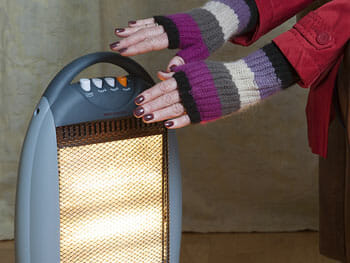
You might know the following scenario: it’s cold outside and getting colder. Sitting around watching TV or simply relaxing with your family is making you shiver, and you don’t have a fireplace. Raising the thermostat setting for the entire house is expensive, so you turn to your portable heater. When the warm air shoots out, you are instantly comforted.
Portable heaters, also known as space heaters, serve a multitude of short-term purposes, such as warming a room with a high ceiling while you are sitting and inactive, or helping an elderly person remain more comfortable on a cold day. They aren’t meant to be a permanent, 24/7 solution, but they can take the edge off on a bitterly cold day.
However, portable heaters can be hazardous. According to the U.S. Consumer Product Safety Commission, more than 25,000 residential fires and more than 300 deaths every year are due to space heaters. It’s also estimated that 6,000 people annually go to emergency rooms to be treated for burns from contact with hot surfaces on heaters in non-fire situations.
Space Heaters Explained
Space heaters are either electric or combustion (requiring propane, natural gas, or kerosene for fuel). Electric space heaters are vent-free or ventless, so you don’t have to worry about exhaust fumes. But running many kinds of unvented combustion heaters can kill you with carbon monoxide. Most states have banned the use of unvented kerosene heaters inside homes, and a few states have banned unvented natural gas heaters. Space heaters that require venting must do so through an outside wall, which means they are no longer portable.
Tips for Safe, Supplementary Heat This Winter
If you are running a liquid-fueled space heater such as a vented kerosene heater, we have the following safety suggestions:
- Use only the correct fuel. Never use gasoline!
- Never fill the heater when it is hot.
- Follow all the manufacturer’s instructions.
If you use an electric portable heater instead, the following precautions are wise:
- Plug electric heaters directly into a wall outlet. Follow the manufacturer’s suggestions when it comes to using an extension cord. Many manufacturers recommend against their usage.
- Make sure your heater has a tip-over switch, meaning it will shut off if it is knocked over.
- If the plug or cord should ever feel hot while the heater is in use, unplug it and do not use it again.
- Make sure your electric heater is UL-approved.
Finally, we have some tips regarding using any kind of portable heater:
- Never run a space heater while you are sleeping, and never place one near a sleeping person.
- If you leave the area, turn off the heater.
- Keep your space heater away from anything flammable, including hair and skin.
- Do not cover the heater with anything.
- Use your heater on a level surface, and keep children and pets away.
- If you use a gas or liquid-fueled heater, have it inspected every year for safety.
Last but not least, don’t forget to have working smoke detectors on each floor, inside each bedroom, and outside the bedrooms in the sleeping areas, and also a carbon monoxide alarm in each sleeping area outside the bedrooms. We at The Law Offices of Steven H. Heisler want you to be warm and happy, but also to remain safe during the cold weather!
We’re Listening. Tell Us What Happened.
Baltimore attorney Steve Heisler has devoted his entire legal practice to representing personal injury cases, including product liability injuries. Steve and his associates can track down negligent manufacturers, sue them, and obtain damages and settlements to help you get your life back on track.
There’s no excuse for injury and death due to dangerous and defective products. If you or a family member has suffered from an injury due to a portable heater, contact The Law Offices of Steven H. Heisler. Keep in mind, however, that there is a statute of limitations – or a time limit – for filing personal injury claims, so you should not delay. Contact us for a free initial consultation by calling (410) 625-4878 or by using our confidential online form.
